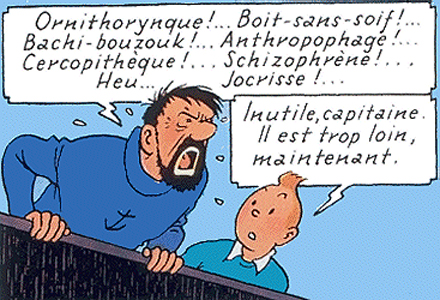Scalpel versus Hammer
“…sleazy rancid twat…” – Tom Kratman about someone daring to dissect his, um, “fiction”; at File770 on May 12, 2015. The comment has since been deleted by site moderators but Internet Rangers never sleep.
Profanity has been with humans ever since we developed language past grunts. Research indicates that it emanates from different centers than those for main language: the limbic syste in charge of the “Four Fs” rather than the cerebral cortex [Tourette syndrome, whose symptoms include out-of-context swearing, has both limbic and cortical components]. This provenance makes swearing the direct descendant of involuntary animal stress vocalizations for anger, fear and pain. It explains why otherwise aphasic stroke victims can still swear and why stutterers nevertheless swear fluently (showcased in The King’s Speech). It also jibes with the fact that swearing can alleviate pain, though only short-term – and only acute pain, not its intractable chronic counterpart.
Swearing is routinely divided into blasphemy (religion) and obscenity (body parts). Steve Pinker has fussily classified swearing into abusive, dysphemistic, idiomatic, emphatic and cathartic – but the significant category overlaps are clearly visible.
Non-reflexive swearing is word magic akin to cursing and as such registers viscerally, but only in one’s natal tongue. Swearing in languages acquired later in life doesn’t deliver this solar-plexus punch, hence the common spectacle of normally restrained or prudish people swearing freely in their non-primary tongues. As with all language, some words may be deemed insults in some contexts but not others, although the basis for the assignment is always obvious (a prime example is “cunt”, convoluted exegeses about its gender – and value – neutrality notwithstanding; even its apologists concede in private that it’s a nuclear-option term).
In most societies, constant swearing is taken as evidence of a limited vocabulary and hence a signifier of low educational and social status. Conversely, uttering obscenities without consequences is the prerogative of those dominant in their local power structures and/or beneficiaries of exceptionalism. Spontaneous swearing is always a physical reaction; on the other hand, calculated swearing is often a way to establish a persona, overcome feelings of inadequacy or claim instant–insider membership in a group. Many in/famous standup comedians are textbook examples of all three. So are rage bloggers and frothing trolls who seem to operate on the assumption that four-letter words (especially about women, especially about older and non-pretty ones) are toughness bona fides.
 Deliberate excessive swearing reminds me of an anecdote about Richard the Lionheart and Salah ad-Din (the story is apocryphal: the two never met face-to-face). Richard, to show his might, whacked a table with his two-handed sword, reducing it to splinters. Saladin removed a silk scarf from around his throat, tossed it in the air and twirled his damascene blade below it. Richard picked up the scarf, only to find out it had been neatly cut in two.
Deliberate excessive swearing reminds me of an anecdote about Richard the Lionheart and Salah ad-Din (the story is apocryphal: the two never met face-to-face). Richard, to show his might, whacked a table with his two-handed sword, reducing it to splinters. Saladin removed a silk scarf from around his throat, tossed it in the air and twirled his damascene blade below it. Richard picked up the scarf, only to find out it had been neatly cut in two.
Likewise, routine heavy use of expletives in conversations obscures the points in an argument, focusing instead on the swearer’s intent to shock… though they rarely awe. A swearer’s goal is often to show “righteous” wrath; but they mostly come across as people who, to use Saxon, can’t hold their shit – or who are using a blunderbuss to obscure the weakness of their position. The polyglot occupancy of the internet (even while English remains its lingua franca) blunts the impact of such words anyway, leaving only the categorization of their user.
Bone-breaking maces have their uses but even the brawniest berserker can be brought low by a well-aimed arrow. Of course, wit can get its wielders beaten, imprisoned or killed, because its targets (usually) recognize it for the subversive instrument it is – and people pricked by sarcasm often fancy themselves alphas in one or more ways. Using a scalpel rather than a hammer in discourse doesn’t necessarily imply a winning position. Nor does it automatically signify ethical or logical superiority. But it evens the playing field, just as the bows and slingshots of Welsh and Cretan commoners obliterated the advantages of patrician heavy armor and just as guerilla warfare has always finessed brute-force frontal battles.
As someone whom many consider an annoyance or obstacle (though they’ve used different terms) I find it amusing, during breaks from important tasks, to poke pinholes in helium or lead balloons of wannabee godlings, rambots and tai tai. That said, my sense of fair play (and, to be frank, my self esteem) prohibits me from tackling the unarmed even with ping pong balls, let alone with Stinger missiles.
https://www.youtube.com/watch?v=u1c_PK2RL-I
[Billy Bragg and Wilco, with Natalie Merchant harmonizing, perform Woody Guthrie’s Way Over Yonder in the Minor Key]
Related articles:
Is It Something in the Water? Or: Me Tarzan, You Ape
Storytelling, Empathy and the Whiny Solipsist’s Disingenuous Angst
Won’t Anyone Think of the Sexbots?!
That Shy, Elusive Rape Particle
Free Speech: Bravehearts and Scumbags
Love, Tantrums and the Critical Reviewe
The Smurfettes Discover Ayn Rand
Images: 1st, Hergé’s Captain Haddock, who at least was inventive and articulate with his cursing; 2nd, Charlie Chaplin as The Tramp, who knew how to prick balloons.



As a medical student, I stood transfixed in front of a patient on the neurology ward. She was the victim of a massive stroke. To all of my questions, she responded slowly with amazingly graphic obscenities. She seemed not to know much about how she felt about her feet, but certain how she stood with respect to my mother and both our genitalia. We should learn how to teach this primitive rat-brain area a larger vocabulary, just for patients like her.
I’m not sure that we can modify that part of the brain easily after early childhood!
> [R]outine heavy use of expletives in conversations obscures
> the points in an argument, focusing instead on the swearer’s
> intent to shock. . .
The Cause As Enunciated By That Other
“Biggest Mouth Of The Moment”
Dr. Sister Grace Hooker
. . .
Do I say “fucking” too much? I have been trying to expand
my profane repertoire. It’s been a long hard fucking road
from there to here. As you can see, I am always getting
fucking waylaid. My students love it. . .
That’s all for now. If I have only skimmed the surface,
I remind you that I am, after all, a nun.
====
— _The American People_ (Vol. 1 “Search For My Heart”)
Larry Kramer
Just picked this up. It’s a **strange** book.
;->
She sounds like a kid who just learned a “naughty” word and flings it around non-stop to see the adults’ reactions.
I’m somewhat shocked by the bad behavior of the people using internet hate-speech etc. My mother raised me to always speak and act in a courteous manner to the people I meet, flesh and blood or otherwise.
Don’t get me wrong- I’m not adverse to bad language in terms of being shocked or squeemish. The context and the intent behind the words matters more than the words themselves.
But, even when cowering behind the anonymity of the internet, I feel that spewing profanity with the intent to wound would besmirch my self esteem far more than that of an intended victim. Assuming that I felt inclined to do so, which I don’t. It is hard to have a civilized conversation with the verbal equivalent of cudgels.
I think humans have a unique advantage in cortical language — so they should put it to use!
This is excellent. I’ve definitely noticed what you say about people swearing more easily in a language that’s not their own, and I was nodding at your point about powerful people being able to use profanity without risk.
Swearing is a hybrid of the visceral and deliberate, this odd intersection is part of its power. It’s an interesting exercise to dissect it.
> Swearing is a hybrid of the visceral and deliberate, this
> odd intersection is part of its power. It’s an interesting
> exercise to dissect it.
I’ve been watching episodes of Nurse Jackie on YouTube. Not only is
the swearing copious and uncensored, it doesn’t get tedious,
because the clever writing uses it to elevate the worldly
sophistication of the dialog. (If only real life were that
smartly written!)
Jackie herself, if such a person could exist in real life, has
more than a little of the psychopath about her. But she’s
a psychopath with a “heart of gold” — there’s no one you’d rather
wake up to in the ER.
Fiction in all its guises is sharpened, heightened and idealized compared to real life — that goes for eloquent swearing as well. I’ve never seen Nurse Jackie but it’s not surprising the show writers optimized the swearing if it’s one of her cornerstone attributes.
I concur completely! Not to mention that calling other humans misogynistic names just isn’t nice.
Athena, I just got to this, and the Tintin image brings back fond memories … “Moule à gaufres! Ectoplasme!”
One of the weirdest things about “cunt” is its use by a certain class of Englishmen as a term of affection for their male buddies as well as a general term of opprobrium for other men—sorta like “nigga” in the U.S. I’m still trying to get my head around that.
I remember being at a haiku slam where a woman with stage fright and a meek, nearly inaudible voice was trying to read a sweet, emotional poem about her grandmother who had just died. She kept getting stuck and having to start over, and after the fifth try, in total frustration, bellowed “MOTHERFUCKER!”
Captain Haddock’s cursing showed great inventiveness on Hergé’s part — but of course articulate curses are an oxymoron.
Excellent post. The tale of Richard and Saladin encompasses this theme perfectly, particularly when it comes to the eloquence of Saladin slicing the silk scarf in two.
Heather, have you seen Ridley Scott’s The Kingdom of Heaven? Its portrayal of Saladin is wonderful as is Ghassan Masoud, the Syrian actor who plays him (the way Saladin looks in that film is how I visualize Keméni Haissé, Meráni Yehán’s third consort).
I have, and I also liked Saladin’s portrayal, as much as some of Eva Green’s scenes as Sibylla.
I agree. The best portrayals were Saladin, Sibylla, Imad (played by Alexander Siddig, who’s been aging like fine wine) and an uncredited Edward Norton as Baldwin. Considering he had to wear a mask throughout, he conveyed volumes with voice play and body language.